- Home
- Roger Zelazny
Home Is the Hangman
Home Is the Hangman Read online
Home Is the Hangman
Roger Zelazny
Roger Zelazny
Home Is the Hangman
Big fat flakes down the night, silent night, windless night. And I never count them as storms unless there is wind. Not a sigh or whimper, though. Just a cold, steady whiteness, drifting down outside the window, and a silence confirmed by gunfire, driven deeper now that it had ceased. In the main room of the lodge the only sounds were the occasional hiss and sputter of the logs turning to ashes on the grate.
I sat in a chair turned sidewise from the table to face the door. A tool kit rested on the floor to my left. The helmet stood on the table, a lopsided basket of metal, quartz, porcelain, and glass. If I heard the click of a microswitch followed by a humming sound from within it, then a faint light would come on beneath the meshing near to its forward edge and begin to blink rapidly. If these things occurred, there was a very strong possibility that I was going to die.
I had removed a black ball from my pocket when Larry and Bert had gone outside, armed, respectively, with a flame thrower and what looked like an elephant gun. Bert had also taken two grenades with him.
I unrolled the black ball, opening it out into a seamless glove, a dollop of something resembling moist putty stuck to its palm. Then I drew the glove on over my left hand and sat with it upraised, elbow resting on the arm of the chair. A small laser flash pistol in which I had very little faith lay beside my right hand on the tabletop, next to the helmet.
If I were to slap a metal surface with my left hand, the substance would adhere there, coming free of the glove. Two seconds later it would explode, and the force of the explosion would be directed in against the surface. Newton would claim his own by way of right-angled redistributions of the reaction, hopefully tearing lateral hell out of the contact surface. A smother-charge, it was called, and its possession came under concealed-weapons and possession-of-burglary-tools statutes in most places. The molecularly gimmicked goo, I decided, was great stuff. It was just the delivery system that left more to be desired.
Beside the helmet, next to the gun, in front of my hand, stood a small walkie-talkie. This was for purposes of warning Bert and Larry if I should hear the click of a microswitch followed by a humming sound, should see a light come on and begin to blink rapidly. Then they would know that Tom and Clay, with whom we had lost contact when the shooting began, had failed to destroy the enemy and doubtless lay lifeless at their stations now, a little over a kilometer to the south. Then they would know that they, too, were probably about to die.
I called out to them when I heard the click. I picked up the helmet and rose to my feet as its light began to blink.
But it was already too late.
The fourth place listed on the Christmas card I had sent Don Walsh the previous year was Peabody's Book Shop and Beer Stube in Baltimore, Maryland. Accordingly, on the last night in October I sat in its rearmost room, at the final table before the alcove with the door leading to the alley. Across that dim chamber, a woman dressed in black played the ancient upright piano, uptempoing everything she touched. Off to my right, a fire wheezed and spewed fumes on a narrow hearth beneath a crowded mantelpiece overseen by an ancient and antlered profile. I sipped a beer and listened to the sounds.
I half hoped that this would be one of the occasions when Don failed to show up. I had sufficient funds to hold me through spring and I did not really feel like working. I had summered farther north, was anchored now in the Chesapeake, and was anxious to continue Caribbean-ward. A growing chill and some nasty winds told me I had tarried overlong in these latitudes. Still, the understanding was that I remain in the chosen bar until midnight. Two hours to go.
I ate a sandwich and ordered another beer. About halfway into it, I spotted Don approaching the entranceway, topcoat over his arm, head turning. I manufactured a matching quantity of surprise when he appeared beside my table with a, "Ron! Is that really you?" I rose and clasped his hand.
"Alan! Small world, or something like that. Sit down! Sit down!"
He settled onto the chair across from me, draped his coat over the one to his left. "What are you doing in this town?" he asked. "Just a visit," I answered. "Said hello to a few friends." I patted the scars, the stains on the venerable surface before me. "And this is my last stop. I'll be leaving in a few hours." He chuckled. "Why is it that you knock on wood?" I grinned.
"I was expressing affection for one of Henry Mencken's favorite speakeasies."
"This place dates back that far?" I nodded.
"It figures," he said. "You've got this thing for the past, or against the present. I'm never sure which."
"Maybe a little of both," I said. "I wish Mencken would stop in. I'd like his opinion on the present…What are you doing with it?"
"What?"
"The present. Here. Now."
"Oh." He spotted the waitress and ordered a beer. "Business trip," he said then. "To hire a consultant."
"Oh. How is business?"
"Complicated," he said, "complicated."
We lit cigarettes and after a while his beer arrived. We smoked and drank and listened to the music.
I've sung this song and I'll sing it again: the world is like an uptempoed piece of music. Of the many changes which came to pass during my lifetime, it seems that the majority have occurred during the past few years. It also struck me that way several years ago, and I'd a hunch I might be feeling the same way a few years hence, that is, if Don's business did not complicate me off this mortal coil or condenser before then.
Don operates the second-largest detective agency in the world, and he sometimes finds me useful because I do not exist. I do not exist now because I existed once at the time and the place where we attempted to begin scoring the wild ditty of our times. I refer to the world Central Data Bank project and the fact that I had had a significant part in that effort to construct a working model of the real world, accounting for everyone and everything in it. How well we succeeded, and whether possession of the world's likeness does indeed provide its custodians with a greater measure of control over its functions, are questions my former colleagues still debate as the music grows more shrill and you can't see the maps for the pins. I made my decision back then and saw to it that I did not receive citizenship in that second world, a place which may now have become more important than the first. Exiled to reality, my own sojourns across the line are necessarily those of an alien guilty of illegal entry. I visit periodically because I go where I must to make my living…That is where Don comes in. The people I can become are often very useful when he has peculiar problems.
Unfortunately, at that moment, it seemed that he did, just when the whole gang of me felt like fuming down the volume and loafing.
We finished our drinks, got the bill, settled it.
"This way," I said, indicating the rear door, and he swung into his coat and followed me out.
"Talk here?" he asked, as we walked down the alley.
"Rather not," I said. "Public transportation, then private conversation."
He nodded and came along.
About three-quarters of an hour later we were in the saloon of the Proteus and I was making coffee. We were rocked gently by the Bay's chill waters, under a moonless sky. I'd only a pair of the smaller lights burning. Comfortable. On the water, aboard the Proteus, the crowding, the activities, the tempo, of life in the cities, on the land, are muted, slowed, fictionalized, by the metaphysical distancing a few meters of water can provide. We alter the landscape with great facility, but the ocean has always seemed unchanged, and I suppose by extension we are infected with some feelings of timelessness whenever we set out upon her. Maybe that's one of the reasons I spend so much time there.
"Fi
rst time you've had me aboard," he said. "Comfortable. Very."
"Thanks…Cream? Sugar?"
"Yes. Both."
We settled back with our steaming mugs and I asked, "What have you got?"
"One case involving two problems," he said. "One of them sort of falls within my area of competence. The other does not. I was told that it is an absolutely unique situation and would require the services of a very special specialist."
"I'm not a specialist at anything but keeping alive."
His eyes came up suddenly and caught my own.
"I had always assumed that you knew an awful lot about computers," he said.
I looked away. That was hitting below the belt. I had never held myself out to him as an authority in that area, and there had always been a tacit understanding between us that my methods of manipulating circumstance and identity were not open to discussion. On the other hand, it was obvious to him that my knowledge of the system was both extensive and intensive. Still, I didn't like talking about it. So I moved to defend.
"Computer people are a dime a dozen," I said. "It was probably different in your time, but these days they start teaching computer science to little kids their first year in school. So sure, I know a lot about it. This generation, everybody does,"
"You know that is not what I meant," he said. Haven't you known me long enough to trust me a little more than that? The question springs solely from the case at hand. That's all."
I nodded. Reactions by their very nature are not always appropriate, and I had invested a lot of emotional capital in a heavy-duty set. So, "Okay, I know more about them than the school kids," I said.
"Thanks. That can be our point of departure." He took a sip of coffee. "My own background is in law and accounting, followed by the military, military intelligence, and civil service, in that order. Then I got into this business. What technical stuff I know I've picked up along the way, a scrap here, a crash course there. I know a lot about what things can do, not so much about how they work. I did not understand the details on this one, so I want you to start at the top and explain things to me, for as far as you can go. I need the background review, and if you are able to furnish it I will also know that you are the man for the job. You can begin by telling me how the early space-exploration robots worked, like, say the ones they used on Venus."
"That's not computers," I said, "and for that matter, they weren't really robots. They were telefactoring devices."
"Tell me what makes the difference."
"A robot is a machine which carries out certain operations in accordance with a program of instructions. A telefactor is a slave machine operated by remote control The telefactor functions in a feedback situation with its operator. Depending on how sophisticated you want to get, the links can be audiovisual, kinesthetic, tactile, even olfactory. The more you want to go in this direction, the more anthropomorphic you get in the thing's design.
"In the case of Venus, if I recall correctly, the human operator in orbit wore an exoskeleton which controlled the movements of the body, legs, arms, and hands of the device on the surface below, receiving motion and force feedback through a system of airjet transducers. He had on a helmet controlling the slave device's television camera, set, obviously enough, in its turret, which filled his field of vision with the scene below. He also wore earphones connected with its audio pickup. I read the book he wrote later. He said that for long stretches of time he would forget the cabin, forget that he was at the boss end of a control loop, and actually feel as if he were stalking through that hellish landscape. I remember being very impressed by it, just being a kid, and I wanted a super-tiny one all my own, so that I could wade around in puddles picking fights with microorganisms."
"Why?"
"Because there weren't any dragons on Venus. Anyhow, that is a telefactoring device, a thing quite distinct from a robot."
"I'm still with you," he said, and "Now tell me the difference between the early telefactoring devices and the later ones."
I swallowed some coffee.
"It was a bit trickier with respect to the outer planets and their satellites," I said. "There, we did not have orbiting operators at first. Economics, and some unresolved technical problems. Mainly economics. At any rate, the devices were landed on the target worlds, but the operators stayed home. Because of this, there was of course a time lag in the transmissions along the control loop. It took a while to receive the on-site input, and then there was another time lapse before the response movements reached the telefactor. We attempted to compensate for this in two ways: the first was by the employment of a single wait-move, wait-move sequence; the second was more sophisticated and is actually the point where computers come into the picture in terms of participating in the control loop. It involved the setting up of models of known environmental factors, which were then enriched during the initial wait-move sequences. On this basis, the computer was then used to anticipate short-range developments. Finally, it could take over the loop and run it by a combination of 'predictor controls' and wait-move reviews. It still had to holler for human help, though, when unexpected things came up. So, with the outer planets, it was neither totally automatic nor totally manual, nor totally satisfactory, at first."
"Okay," he said, lighting a cigarette. "And the next step?"
"The next wasn't really a technical step forward in telefactoring. It was an economic shift. The pursestrings were loosened and we could afford to send men out. We landed them where we could land them, and in many of the places where we could not, we sent down the telefactors and orbited the men again. Like in the old days. The time-lag problem was removed because the operator was on top of things once more. If anything, you can look at it as a reversion to earlier methods. It is what we still often do, though, and it works."
He shook his head.
"You left something out between the computers and the bigger budget." I shrugged.
"A number of things were tried during that period, but none of them proved as effective as what we already had going in the human-computer partnership with the telefactors."
"There was one project," he said, "which attempted to get around the time-lag troubles by sending the computer along with the telefactor as part of the package. Only the computer wasn't exactly a computer and the telefactor wasn't exactly a telefactor. Do you know which one I am referring to?"
I lit a cigarette of my own while I thought about it, then, "I think you are talking about the Hangman," I said.
"That's right and this is where I get lost. Can you tell me how it works?"
"Ultimately, it was a failure," I told him.
"But it worked at first."
"Apparently. But only on the easy stuff, on Io. It conked out later and had to be written off as a failure, albeit a noble one. The venture was overly ambitious from the very beginning. What seems to have happened was that the people in charge had the opportunity to combine vanguard projects, stuff that was still under investigation and stuff that was extremely new. In theory, it all seemed to dovetail so beautifully that they yielded to the temptation and incorporated too much. It started out well, but it fell apart later."
"But what all was involved in the thing?"
"Lord! What wasn't? The computer that wasn't exactly a computer…Okay, well start there. Last century, three engineers at the University of Wisconsin, Nordman, Parmentier, and Scott, developed a device known as a superconductive tunnel-junction neuristor. Two tiny strips of metal with a thin insulating layer between. Supercool it and it passed electrical impulses without resistance. Surround it with magnetized material and pack a mass of them together, billions, and what have you got?" He shook his head.
"Well, for one thing you've got an impossible situation to schematize when considering all the paths and interconnections that may be formed. There is an obvious similarity to the structure of the brain. So, they theorized, you don't even attempt to hook up such a device. You pulse in data and let it establish its own preferential pathw
ays, by means of the magnetic material's becoming increasingly magnetized each time the current passes through it, thus cutting the resistance. The material establishes its own routes in a fashion analogous to the functioning of the brain when it is learning something.
"In the case of the Hangman, they used a setup very similar to this and they were able to pack over ten billion neuristor-type cells into a very small area, around a cubic foot. They aimed for that magic figure because that is approximately the number of nerve cells in the human brain. That is what I meant when I said that it wasn't really a computer. They were actually working in the area of artificial intelligence, no matter what they called it."
"If the thing had its own brain, computer or quasihuman, then it was a robot rather than a telefactor, right?"
"Yes and no and maybe," I said. "It was operated as a telefactor device here on Earth, on the ocean floor, in the desert, in mountainous country, as part of its programming. I suppose you could also call that its apprenticeship, or kindergarten. Perhaps that is even more appropriate. It was being shown how to explore in difficult environments and to report back. Once it mastered this, then theoretically they could hang it out there in the sky without a control loop and let it report its own findings."
"At that point would it be considered a robot?" "A robot is a machine which carries out certain operations in accordance with a program of instructions. The Hangman made its own decisions, you see. And I suspect that by trying to produce something that close to the human brain in structure and function, the seemingly inevitable randomness of its model got included in. It wasn't just a machine following a program. It was too complex. That was probably what broke it down."
Don chuckled.
"Inevitable free will?"
"No. As I said, they had thrown too many things into one bag. Everybody and his brother with a pet project that might be fitted in seemed a supersalesman that season. For example, the psychophysics boys had a gimmick they wanted to try on it, and it got used. Ostensibly, The Hangman was a communications device. Actually, they were concerned as to whether the thing was truly sentient."

 Seven Tales in Amber
Seven Tales in Amber Frost and Fire
Frost and Fire Doorways in the Sand
Doorways in the Sand Unicorn Variation
Unicorn Variation A Night in the Lonesome October
A Night in the Lonesome October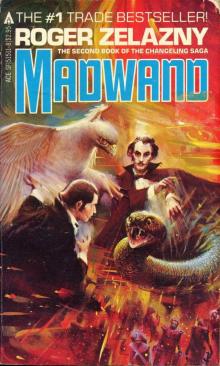 Madwand
Madwand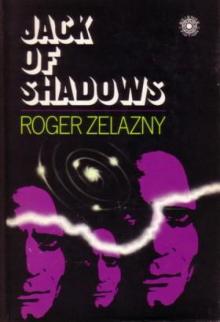 Jack Of Shadows
Jack Of Shadows Lord of Light
Lord of Light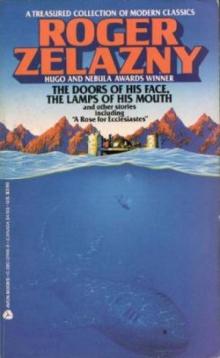 The Doors of His Face, The Lamps of His Mouth and Other Stories
The Doors of His Face, The Lamps of His Mouth and Other Stories Guns Of Avalon tcoa-2
Guns Of Avalon tcoa-2 Coils
Coils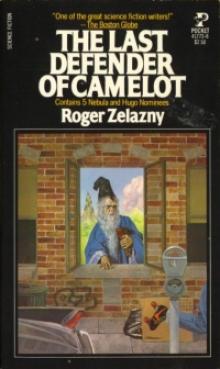 The Last Defender Of Camelot
The Last Defender Of Camelot Creatures of Light and Darkness
Creatures of Light and Darkness This Immortal
This Immortal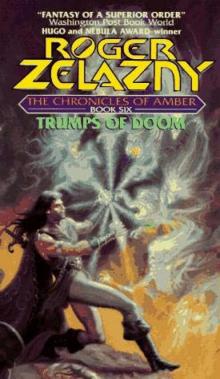 Trumps of doom tcoa-6
Trumps of doom tcoa-6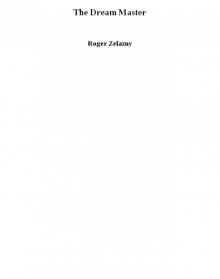 The Dream Master
The Dream Master The Complete Dilvish, The Damned
The Complete Dilvish, The Damned Nine Princes in Amber
Nine Princes in Amber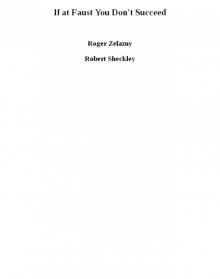 If at Faust You Don't Succeed
If at Faust You Don't Succeed Here there be dragons
Here there be dragons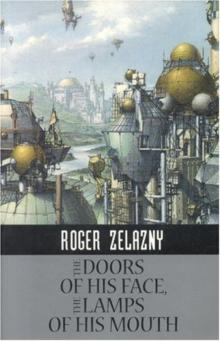 The Doors Of His Face, The Lamps Of His Mouth
The Doors Of His Face, The Lamps Of His Mouth The Great Book of Amber - Chronicles 1-10
The Great Book of Amber - Chronicles 1-10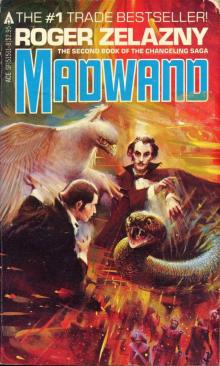 Madwand (Illustrated)
Madwand (Illustrated) The Chronicles of Amber
The Chronicles of Amber To Die In Italbar
To Die In Italbar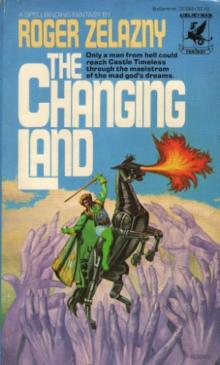 The Changing Land
The Changing Land The Furies
The Furies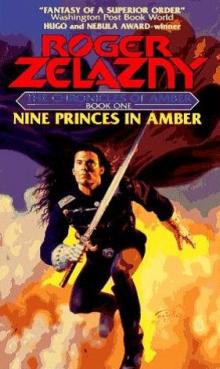 Nine Princes In Amber tcoa-1
Nine Princes In Amber tcoa-1 Last Of The Wild Ones
Last Of The Wild Ones Sign of the Unicorn tcoa-3
Sign of the Unicorn tcoa-3 My Name is Legion
My Name is Legion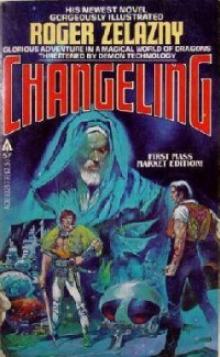 Wizard World 1: Changeling
Wizard World 1: Changeling Changeling
Changeling The Shroudling and the Guisel (amber stories)
The Shroudling and the Guisel (amber stories)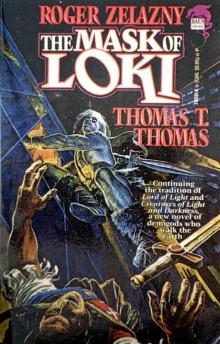 The Mask of Loki
The Mask of Loki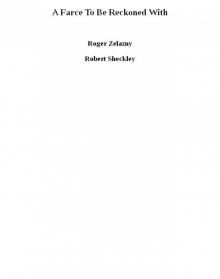 A Farce To Be Reckoned With
A Farce To Be Reckoned With Roadmarks
Roadmarks When Pussywillows Last in the Catyard Bloomed (rtf)
When Pussywillows Last in the Catyard Bloomed (rtf)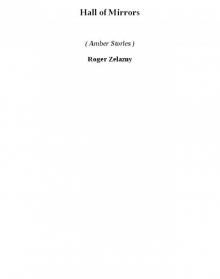 Hall of Mirrors (amber stories)
Hall of Mirrors (amber stories) Permafrost
Permafrost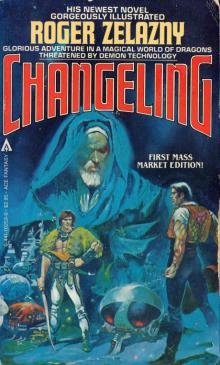 Changeling (Illustrated)
Changeling (Illustrated) Donnerjack
Donnerjack Shadows & Reflections: A Roger Zelazny Tribute Anthology
Shadows & Reflections: A Roger Zelazny Tribute Anthology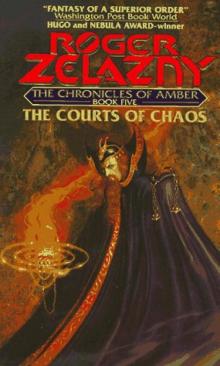 The Courts Of Chaos tcoa-5
The Courts Of Chaos tcoa-5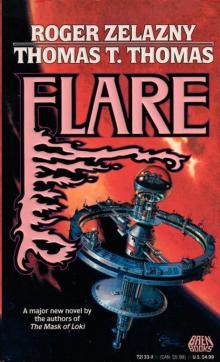 Flare
Flare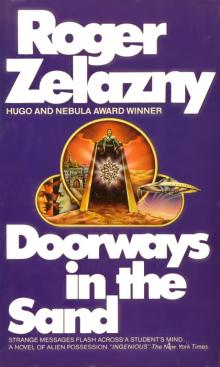 Doorsways in the Sand
Doorsways in the Sand The Great Book of Amber
The Great Book of Amber Home Is the Hangman
Home Is the Hangman For a Breath I Tarry
For a Breath I Tarry Isle Of The Dead
Isle Of The Dead Salesman Tale (amber stories)
Salesman Tale (amber stories) Dismal Light
Dismal Light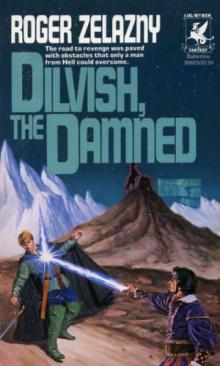 Dilvish, The Damned
Dilvish, The Damned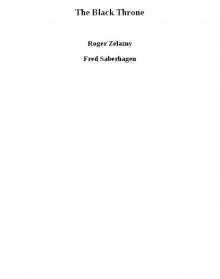 The Black Throne
The Black Throne Wizard World 2: Madwand
Wizard World 2: Madwand The Salesman's Tale
The Salesman's Tale